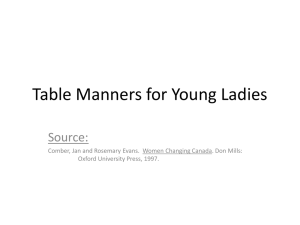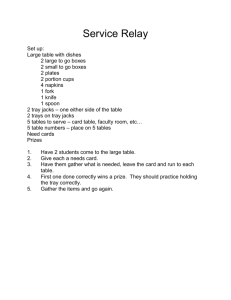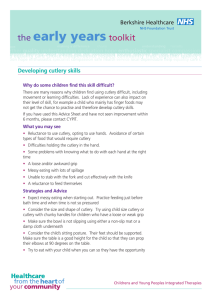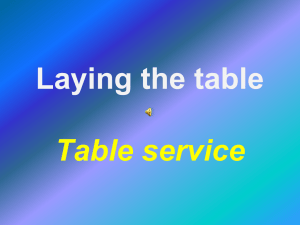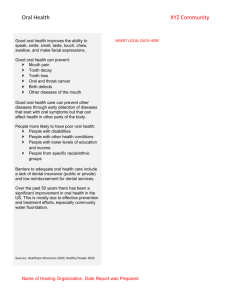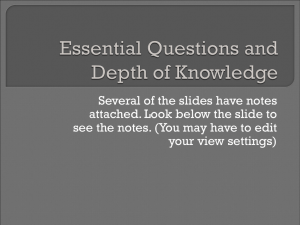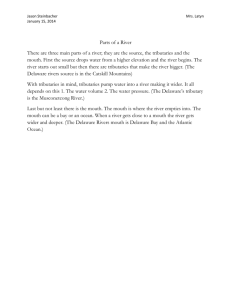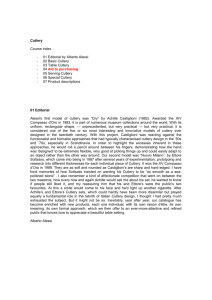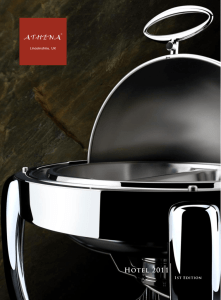Telephone
advertisement
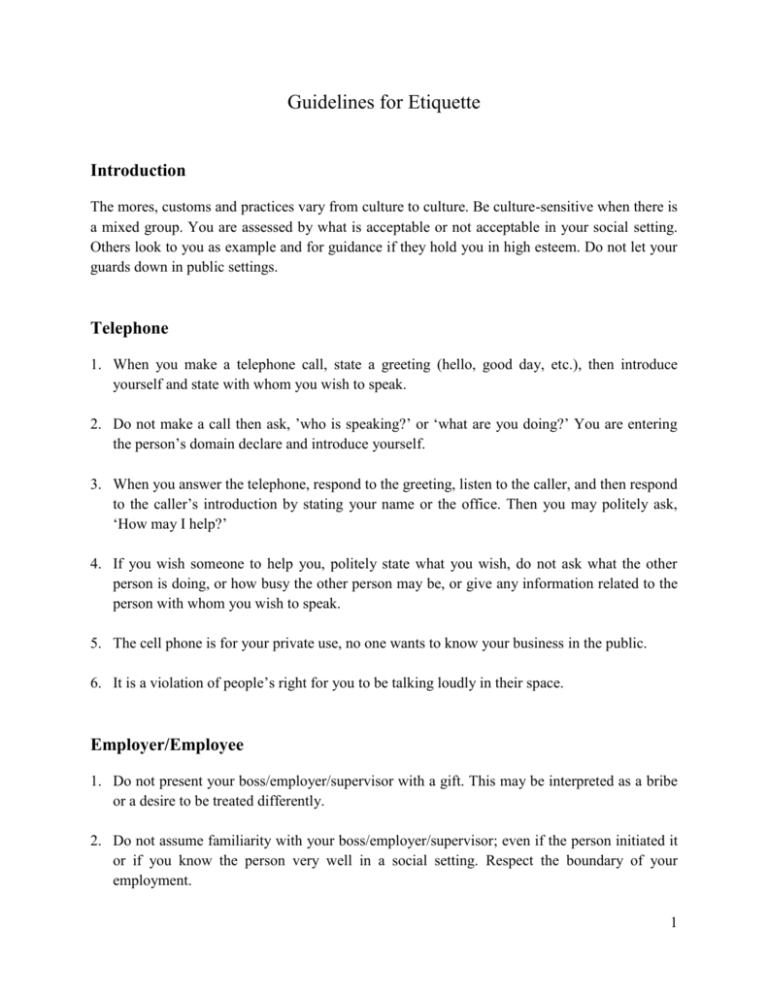
Guidelines for Etiquette Introduction The mores, customs and practices vary from culture to culture. Be culture-sensitive when there is a mixed group. You are assessed by what is acceptable or not acceptable in your social setting. Others look to you as example and for guidance if they hold you in high esteem. Do not let your guards down in public settings. Telephone 1. When you make a telephone call, state a greeting (hello, good day, etc.), then introduce yourself and state with whom you wish to speak. 2. Do not make a call then ask, ’who is speaking?’ or ‘what are you doing?’ You are entering the person’s domain declare and introduce yourself. 3. When you answer the telephone, respond to the greeting, listen to the caller, and then respond to the caller’s introduction by stating your name or the office. Then you may politely ask, ‘How may I help?’ 4. If you wish someone to help you, politely state what you wish, do not ask what the other person is doing, or how busy the other person may be, or give any information related to the person with whom you wish to speak. 5. The cell phone is for your private use, no one wants to know your business in the public. 6. It is a violation of people’s right for you to be talking loudly in their space. Employer/Employee 1. Do not present your boss/employer/supervisor with a gift. This may be interpreted as a bribe or a desire to be treated differently. 2. Do not assume familiarity with your boss/employer/supervisor; even if the person initiated it or if you know the person very well in a social setting. Respect the boundary of your employment. 1 General Relationship 1. If you wish to assist someone simply state your ability, interest, or care; do not make reference to the person’s inability, inadequacy, or anything that may relate to the persons incompetence. 2. When making reference to what someone said or did, state what you think you heard or observed (even though you may be very accurate with hat you say); rather than quoting or stating what the persons said or did. Avoid being called judgmental. Sometimes people mishear or misunderstand others. 3. Do not speak when another person is speaking; listen and show respect to the person who is given the permission to speak. Wait in silence for your turn. 4. Always say thanks to everyone for everything (tangible object, helpful information, act of kindness, word of compliment) even though it may seem small and insignificant. 5. In presenting any object to anyone make the appearance acceptable - always put money in an envelope or neatly folded in paper, a written document in an envelope or neatly folded, a hard object in a bag. 6. When you are returning an object to anyone always strive to return it in a better condition than you received it, honor the timeframe and any other condition laid out. 7. In passing an object to someone give it in the hand of the individual, do not throw it. The person who receives it should get it in the manner it should be used – a pair of scissors should be given with the handle turned to the receiver. A mug should be given with the handle turned to the receiver. 8. Show respect to another person’s body space; do not invade by passing too closely without first seeking permission, and hearing, yes you are permitted, before proceeding. 9. Do not speak privately to one person when you are in company with others. Public Relations 1. Do not call attention to yourself but constantly scratching or touching parts of your body. Attending to you hair, application of make-up and hygienic practices are reserved for private places. 2 2. Do not call attention to others’ limitations, weaknesses, inabilities or handicap, by gazing, or pointing out, or talking about the issue. This makes the person self-conscious, uncomfortable and embarrassed. (Appreciate the differences among humankind and thank God for your gifts.) 3. Do not talk personal business in public places. No one indicated that she/he has interest in your affairs. 4. Do not speak secret in company of others. 5. If it is not an emergency, ignore any call, text, email, message when you are in company 6. Do not answer the cell phone in company of others, excuse yourself to do so. 7. In a meeting with the agreement from all, a telephone call may be taken if it pertains to the business at hand. 8. Address in public, even the people you know very well and call by first name, as Mr., Mrs., or by title – Dr. or the Rev. If permission is granted in the setting then you may use first name. 9. If you join a group of persons, greet all before you proceed to the one person you really want to meet. 10. If you are offered anything your response would be ‘Yes, please’ or ‘No, thanks’. 11. Keep eye contact, but do not stare, the person(s) with whom you share in a group setting in conversation or at a meal. 12. There shall be no secret in company. Acknowledge all gathered in the group. 13. Do not overlook or ignore the presence of anyone in a group. 14. Listen intently, so that you do not have to ask persons to repeat. 15. You speak clearly that no one has to ask you to repeat. 16. Do not have chewing gum in your mouth while talking to others. (Generally speaking, chewing in public is not an acceptable protocol. Chewing is reserved for dining areas.) 3 17. Watch your body language and grimaces on your face, sometimes you convey more by what you show than by what you say. 18. When in doubt give others the benefit of whatever is ambiguous, except in a debate. In other words, keep the peace. 19. Control your voice to match the space, the size of the group, and the occasion. 20. Do not put your hand to your face or your finger to your mouth when you speak. People need to hear you clearly. 21. Do not ask personal questions in a group of people with whom you or they are not very familiar. 22. Do and Say private things in private and public things in public. 23. Do not raise private topics in a group that is not committed to each other’s cause. 24. Do not interrupt one’s conversation except for emergency, ask permission by saying, ‘Excuse me please’. 25. Do not speak while another person is speaking; wait for your turn; and indicate a point of order or emergency why you must interject at a specific point. 26. Do not eavesdrop on other’s conversation. 27. Excuse yourself from the group by informing all. 28. To pass in an area blocked, controlled, protected or secluded, ask permission and listen for permission granted, before you proceed. Personal Relationship 1. Treasure genuine friendship, be a confidante and respect other’s privacy, even for that which you may not consider to be private. 2. Do not share information about others that you know they would not like others to hear. 4 3. Be mindful of others’ body space. The level of friendship or familiarity will determine the number of inches or even feet away from another. 4. Keep the distance that another prefers. Do not invade someone’s space. 5. Do not touch what is not yours unless you are asked to take to the owner. 6. Do not search through other’s belongings, especially a lady’s purse. 7. Shaking hands, embracing, and kissing, all depend on the nature of the relationship, the occasion for meeting, and the company in which you are gathered. 8. Test the mood of an individual before you relate in the normal fashion. What is acceptable on one day may not be acceptable on another day. 9. Express kindness, generosity and care to all on the level the recipient is comfortable. 10. Lending and borrowing money can prove deadly in a relationship, if there is no mutual responsibility, reciprocal accountability and a sense of maturity. It is best to give as much as you can afford rather than to lend. 11. Avoid borrowing money, by simply living within your means or better still living below your means. 12. Set boundaries for yourself and the relationship, and respect other people’s boundaries. Establish the acceptable times to visit, to telephone and to interface. 13. Relationship has two sides. Give as much as you would like to receive. If it is not reciprocal, re-visit your understanding of the relationship. There may be a message indicating that the other does not really care to establish relationship with you. Fine Dining 1. Arrange to sit with others of your company at the same time. The waiters prefer to deal with the table as a whole company. 2. First remove the napkin from the table to your lap or your neck before you start drinking or eating. Use napkin regularly to ensure that nothing sticks on your lips. 5 3. Share in pleasant conversation while dining but be sure that your mouth is free of food and drink. Do not talk while food or drink is in your mouth. 4. If the setting has many pieces of cutlery, start using those set furthest away from the side of the plate. For the next course, move to those inner. Always maintain a knife and fork unless the waiter/waitress says to hand over all. 5. Sometimes 3 glasses are set, the stemmed one may be for wine, the narrower one may be for your juice and the bulging one may be for water. 6. If a straw is provided, use it rather than drinking directly from the glass. It is always safe to protect your teeth from the negative effects of some drinks. Sometimes the host does not want your marks to be left on the crystals. 7. Choosing which cutlery to use - start the first course with the cutlery that are set furthest out, if there is more than one knife or fork. 8. There is soup spoon for soup, a dessert spoon for dessert, and a teaspoon for tea or coffee. 9. Spoon is for shoveling; do not heap up a large amount onto the spoon, only what fits into your mouth comfortably. 10. Knife is for cutting food into smaller pieces. The knife is held in the right hand. 11. Fork is used for sticking the large piece as you cut off pieces with the knife. The fork is held in the left hand. However, if you choose to use fork alone, then the fork will be in the right hand. 12. Preferably, cut off the pieces to have only the right size to put into your mouth with the fork. 13. Do not bite off from a large piece and place the remainder back to the plate. Even with a roll and bread, break off the amount that fits comfortably into your mouth. Do not bite off piece by piece. 14. If the right amount of food is placed in your mouth, there would be no bulging at the cheeks. 15. Chew at a reasonable pace (not too fast and not very slowly). 16. Do not wave cutlery if you wish to get someone’s attention. Put down the cutlery, then wave. 6 17. Keep arms relatively close to your body do not extend into other people’s space. Even if the space next to you is unoccupied do not expand yourself. 18. You may lean your forearm (that is, the area between elbow and wrist) on the table. 19. Never place your elbow on the table. 20. Wait on everyone to start eating together, unless it is stated by members of your company that you may go ahead. 21. During the course of dining use your napkin to remove any mark that may be left on your mouth from food or drink, and replace to your lap or at your neck. 22. Do not put your hand at your face, or your finger to your mouth, or raise the cutlery or glass too far from the table. 23. Relate personally to the persons sitting closest to you. Before serving yourself ask those immediately around you if they wish you to serve them or simply pass the dish or drink to them first. 24. Do not stretch across a table to reach for any dish or object on the table. 25. Ask someone closest to the dish or object to pass to you by sending it around in a chain until it gets to you. 26. In passing the item ensure that the way you pass it, is the way you wish the person to receive it. That is, you should hold the end or side in such a way that the person may receive it by the handle or the right end. E.g. pass a jug so that the receiver may receive it by the handle. 27. Observe the quantity available on the table and calculate how much you should have in relation to number of persons at the table. 28. As your first serving take small amounts, not only in respect of others at the table, but to save wastage just in case if you do not like the taste. 29. Take a second helping if there seems to be enough for all, but first indicate to others that is your intention and get their approval. 30. Do not put on your plate more than you may eat. Leave your plate empty. (Remember the many people who go without food each day.) 7 31. When eating from a dish (soup, cereal) tilt the dish away from you to get to the last amount in the dish. (Avoid spilling on yourself.) 32. When you are finished, show that you are finished by closing off knife and fork, putting them together in the plate, Do the final cleaning up of your mouth and replace napkin to the table. 33. Do not leave the table before everyone is finished. In response to an emergency seek the excuse from all and hear the response, ‘yes’, then you may leave the table. 34. Even if everyone is finished and all show no inclination of leaving immediately you still need to seek permission to be excused. 35. Put your chair back in place before leaving even if it is for a temporary move. Do not create objects for injury. 36. If you are invited to a meal, take your cue from the host/hostess to know if it is a formal or informal setting. 37. Do not start eating before your hostess/host. Wait for the hostess/host to indicate that you may start before her/him. 38. If you are asked to serve, serve dishes on the left side of the person, remove dishes from the right side of the person. Male / Female Outdoor Relations 1. When you sit occupy only the space provided for you. 2. As a couple, the female sits on the left side of the male. (To remember this - keep right hand free to defend female, or keep female close to your heart.) This applies to walking too. 3. To enter or exit a room clear the path for the female by opening the door and when you are in or out then close door behind you. 4. Find a seat for the female; assist her by pulling out the chair and sliding it back after she is seated, before you take your seat. 8 5. When leaving the chair where you sat, put it back in its place. You may also assist the female in doing so. 6. Offer to assist a female who wishes to stand, that is, you will rise before the female and extend you hand whether she needs it or not. 7. Offer to assist a female who is getting out of a vehicle, you will get out before the female and extend you hand whether she needs it or not. T. Anne Daniel January 7, 2014 9
